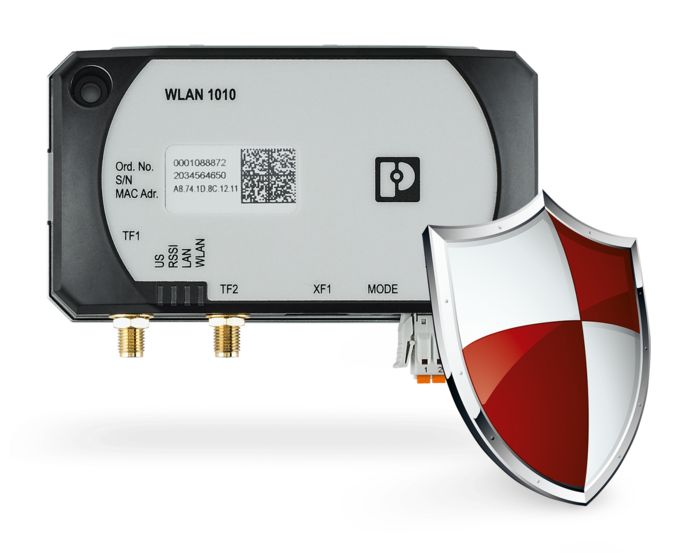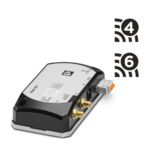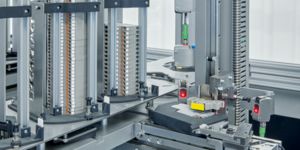WLAN 1000 and 2300 The robust WLAN 1000 (client) and 2300 (access point) wireless modules have been specially developed for the requirements of industry and support the latest-generation Wi-Fi 6 and Wi-Fi 6E standards for maximum performance and future-proofing. Choose between devices with external antenna connections for complex wireless tasks and versions with integrated antennas for easy, space-saving mounting.


Two external antennas on the WLAN 1020 ensure ideal wireless coverage
Compact and flexible WLAN 1020
Vehicles, warehouse shuttles, and machines need to be small. All components must therefore be compact and flexible in mounting. This is exactly what the WLAN 1020 (WLAN client and soft access point) series was developed for. The compact WLAN module supports the latest-generation Wi-Fi 6/6E standards (depending on the version) and offers triple-band functionality for 2.4 GHz, 5 GHz, and 6 GHz. It can be mounted on walls and panels, or simply snapped onto a DIN rail. The metal base plate ensures secure attachment and reliable heat dissipation.
The FL WLAN 1020 is equipped with two antenna connections to ensure good wireless coverage even in difficult spaces. You therefore always have the optimum antenna solution.
Your advantage: Optimum reception and flexible mounting

WLAN 1120 is easy to mount
Space-saving complete solution WLAN 1120
With the WLAN 1120 (WLAN client), the wireless module and antennas are combined in a single compact device that can be easily screwed to the control cabinet or the machine.
Due to the single-hole mounting, the WLAN 1120 wireless module is as easy to install as an antenna. A 40 mm hole on the machine or the control cabinet is all that is required. The power supply and Ethernet are connected via Push-in connector and RJ45 connector respectively. Because the WLAN module does not take up any space in the control cabinet, it can be retrofitted easily at any time. The WLAN 1120 housing is extremely robust and also withstands high mechanical loads and impacts (IK08 impact resistance).
Your advantage: Fast and space-saving installation

The WLAN 2300 is mounted directly in the field
Robust design WLAN 2300
The 2300 series access point has been specially developed for direct installation in demanding industrial environments. Its robust housing, high temperature resistance from -30 to +60°C and IP65 degree of protection make it the ideal solution for use in extreme conditions. The WLAN 2300 offers full functionality including OFDMA, supports up to 200 devices and ensures maximum performance and stability, even in networks with a high device density. With the compact design, the choice of internal or external antennas and the option of simply attaching the device to the panel or a profile, installation is flexible and uncomplicated.
Your advantage: Ideal solution for field installation

Reliable with Wi-Fi 6/6E
With Wi-Fi 6 (IEEE 802.11ax), the 1000 and 2300 series WLAN modules support the latest standard for wireless networks. This means efficient use of the frequency spectrum, higher data rates and stable performance even in heavily used environments. Technologies such as OFDMA, MU-MIMO, and TWT ensure maximum efficiency. Wi-Fi 6E is a particular highlight. Depending on the type and country approval, the devices of the new WLAN generation are triple-band capable and can also use the 6 GHz frequency band. This opens up free channels, less interference and the full benefits of Wi-Fi 6 in the 6 GHz band. This means you are ideally equipped for the increasing demands of state-of-the-art industrial applications.
Your advantage: powerful, efficient, and robust Wireless LAN

Particularly secure with security standards and usage profiles
Maximum security for your network
Protecting your network and your data against misuse and manipulation is our highest priority. The 1000 and 2300 series WLAN modules use the latest security mechanisms and meet all current standards. With WPA3 encryption, you can enjoy maximum WLAN security and reliable protection against unauthorized access. In addition, the development process for our products is certified in accordance with IEC 62443-4-1 and the devices are compatible with IEC 62443-4-2. To guarantee you the highest level of safety and conformity, the modules also meet the strict RED security requirements.
Your advantage: Security against manipulation and misuse

Full reception with the WLAN 1000 and 2300
Full reception with the optimized antenna technology
Good signal reception is key for fast and reliable wireless communication. Installing high-quality antennas is therefore essential. Two powerful antennas with MIMO (multiple-input, multiple-output) technology are installed in the WLAN 1120 and 2300 devices. They ensure fast and stable wireless reception wherever you need it. This significantly increases the robustness, speed, and range of your wireless communication.
Your advantage: Full reception at all times

The WLAN 1010 can be configured via REST API
Easy to control via the PLC – via REST API
The WLAN 1000 and 2300 can be configured easily and controlled for runtime via a REST API using a PC or PLC. Several WLAN modules can therefore be configured quickly and easily with one command. Furthermore, network administration tasks can be automated via the controller, for example, in order to assign a new single-use WLAN password to WLAN users for each connection. This is a simple solution to the security risk arising through use of shared, static WLAN passwords.
Your advantage: Full control for machine programming

Automatic roaming by mobile devices in the WLAN network
Roaming – mobility in the network
One of the greatest strengths of WLAN is its mobility. Devices can move freely around the network and automatically connect to the access point that offers the strongest signal.
For industrial applications in particular, it is crucial that roaming works quickly and reliably. With our WLAN solutions, switching between wireless cells takes less than 100 ms.
Your advantage: Uninterrupted communication and maximum performance, even in large WLAN networks with many moving devices
Overview of WLAN 1000 and 2300
 |
 |
 |
|
|---|---|---|---|
| WLAN 1020 | WLAN 1120 | WLAN 2300 | |
| Characteristics | |||
| Mounting type | In the control cabinet, in control boxes | On the control cabinet, machines, etc. | Panel mounting, profile etc. |
| Function | Client (limited access point functionality) | Client (limited access point functionality) | Access point |
| Maximum number of WLAN clients | 10 (per virtual WLAN interface) | 10 (per virtual WLAN interface) | 100 (per virtual WLAN interface) |
| WLAN standards | Wi-Fi 6, backward-compatible with Wi-Fi 4/5 | Wi-Fi 6, Wi-Fi 6E (WLAN 1122 only) | Wi-Fi 6, Wi-Fi 6E (WLAN 2350/2351 only) |
| Frequency band | 2.4 and 5 GHz, 6 GHz (WLAN 1021/1022 only)¹⁾ | 2.4 and 5 GHz, 6 GHz (WLAN 1121/1122 only)¹⁾ | 2.4 and 5 GHz, 6 GHz (WLAN 2350/2351 only)¹⁾ |
| Maximum data rate (gross) | 2,400 Mbps | 2,400 Mbps | 2,400 Mbps |
| Maximum data rate (net) | >600 Mbps | >600 Mbps WLAN 1120 | >600 Mbps |
| antennas | two external connections (RSMA) | two internal antennas (5 dBi) | WLAN 2330/2331: two external connections | WLAN 2340/2341: internal antennas | WLAN 2350/2351: internal |
| Maximum transmission power | <19 dBm (antenna connection) | <20 dBm (incl. antennas) | <20 dBm (incl. antennas) |
| Degree of protection | IP20 | IP68 | IP65 |
| Ambient temperature (operating) | -30°C … +60°C | -30°C … +60°C | -20°C … +60°C |
| μSD slot | 1 | – | 1 |
| Ethernet | 1x RJ45 | 1x RJ45 | 1x M12 |
| Power over Ethernet (PoE) | – | – | 1 |
| Class 1 Div 2 | WLAN 1021 | WLAN 1121 | WLAN 2331/2341/2351 |
| To the product list | To the product list | To the product list |
¹⁾ Country-specific approvals for the 6 GHz band available on request depending on the regulations in the countries




